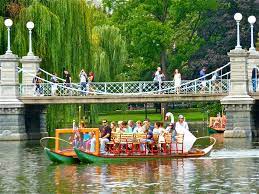
Remember public parks? You entered them with only one thought in mind: enjoying the fresh air, the greenery, the pond, maybe, with some ducks, swans, and geese.
Today, even public parks have become fraught. Some, in the interest of “social distancing,” are being closed like our beaches. Others are still open, but decidedly not with the same vibe.
Yesterday my wife and I visited a park with trails that ran through fields, woods, and salt marshes. One trail led to the sea, where the Atlantic was in high dudgeon, crashing beautifully against the shore.
Coming back on a narrow stretch of trail through the woods, we came across another couple coming the other way. The woman reacted oddly. She stepped off the path into the wood, despite the fact that the grounds were soaked and her sneakers were getting wet. She turned her back to us as we passed around four feet away (we could do no better).
It took all of two seconds to pass, and yet her reaction was almost medieval, as if we were misunderstood lepers or something. Welcome to the new world of coronavirus, where something as ordinary as public parks, like everything else, are suddenly transformed and other-worldly.
And while some might consider it overreaction, her behavior at least deserves respect on multiple fronts: She’s doing the right thing for the community, what she’s been asked to do, what science recommends that we do until we get through this. It’s odd, but it’s where we’re at now.
So let’s get nostalgic, shall we, and look at Wendy Mnookin’s poem, “The Public Garden.” By line 3 in stanza one, you know it is Boston (“swan boats”), a place I’ve been more than once. And yet, reading it deep in March of 2020, it all appears rather strange.
The Public Garden
Wendy Mnookin
The sun is shining and I’m content
to be myself, walking across the Common
as families queue up by the Swan Boats,
real swans parting the water
in elegant wakes. This is
la vie en rose—
on a lawn vivid with spring
people walk their dogs, peeling off
in clusters of introduction and gossip;
below a sign that shouts Don’t
Feed the Ducks, families throw
wadded-up bread into the pond;
kids on the carousel want
More! More! Frisbee players,
tourists in Red Sox caps, babies
with their dimpled elbows,
the guy on stilts, the pretzel vendor,
the woman holding out a cup for change
as she recites our forecast,
I’m taking it in, all of it, sun
and melting cones, skinned knees
and soothing words
and single shining tears,
whatever love has rained on us all.
Weird how the times can make lines read differently. For instance, “peeling off / in clusters of introduction and gossip;” That’s history.
And the civil disobedience bit rings a bit more true and a bit more foreboding: “below a sign that shouts Don’t / Feed the Ducks, families throw / wadded-up bread into the pond”.
Because the reality is this: For every woman who turns her back to you and huddles hard against a forest to protect herself from possible “community transmission,” there are 50 people who are flouting the rules, who think this is all of a joke, who are—as much as possible—proceeding with life as usual, to the detriment of all. My rights over your rights, in other words. People who are a community of one.
Yep. These are strange times, all right. And, in some cases, it means you read poems through a glass darkly, seeing them in new and unexpected ways. A public garden, for instance, as bit of unanticipated nostalgia.
Context, it’s called. And the inevitable melting cones and skinned knees of history that only was yesterday.
